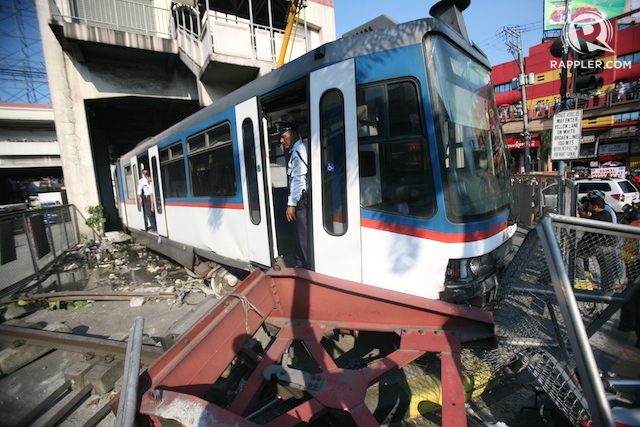SUMMARY
This is AI generated summarization, which may have errors. For context, always refer to the full article.
 It was 2 PM on a Wednesday. EDSA had not shaken off its morning rush hour pace and I had about an hour to get from Quezon City to Makati. I decided it would be better to take the MRT.
It was 2 PM on a Wednesday. EDSA had not shaken off its morning rush hour pace and I had about an hour to get from Quezon City to Makati. I decided it would be better to take the MRT.
Mistake. Big one.
The relatively short time to buy a ticket did not prepare me for the line on the train platform that grew by the minute as commuters arrived faster than trains. (READ: MRT, a capacity conundrum)
It would take at least 15 minutes for the next train to arrive, the security guard said. As it did every day, said the woman behind me – even in the dead hours of mid-afternoon.
As a train finally inched closer to the platform, the guards instantly became more alert watching for pushing and shoving. People at the front of the line were precariously hanging on the edge of platform maintaining a safe distance was impossible.
When the train came to a slow stop and opened its doors, lines merged as people scrambled their way to the front, afraid of missing their chance to get on. It would take another two trains to arrive before I could finally get in.
Inside, women shepherding young children could do no more than shield their tiny heads with their hands to prevent them from being squished. With bodies packed as densely as they were, there was no chance to see a small child unless you were directly standing over them.
A public service announcement came on as the train doors shut and the car lurched forward. “Please hold on for safety.”
I snorted. With nothing to hold onto except each other, and no space for movement, the message sounded both sarcastic and mocking. I could not only hear the other person’s breathing, I could feel it as surely as I could feel the beads of sweat pooling at my back.
I had earlier taken pictures of the queue on the train platform. Inside the train, I vainly tried to take a video to capture the voices of women making annoyed pleas to make way so they could get out, of mothers desperately begging for space for their children. “May bata po (There’s a child).”
Then I heard an elderly lady say under her breath, “This is public transportation. If you don’t want to be touched, you should take a taxi. Kung maselan ka, mag taxi ka.” (If you’re going to be picky, take a taxi.)
“Ma’am, this is public transportation that’s why it should be safe and accessible. Don’t you think the government owes us that as taxpayers?” I said shocked and frustrated.
She repeated what she said emphasizing the option to take a taxi. (READ: When the MRT was awesome)
“We pay for this service with our taxes. Don’t you think we deserve better than this?” I asked, noticing that it was beginning to sound more like a desperate plea of the other passengers trying to get out.
Every argument I made about safety hazards and what effective public transportation should be like fell on deaf ears.
I continued to be admonished for not wanting to be touched and was advised to hail a cab.
‘Learned helplessness’

I posted the pictures on the train platform and my exchange with my co-passenger on Facebook, and friends echoed my frustration.
Writer Karen Kunawicz described riding the MRT as only a notch higher to being herded away like cattle.
Tek Cortez said commuting took already scarce time away from his family. His wife, Cathy, posted a picture of a strike at London’s tube station saying their strike looked like a normal commuting day in the Philippines.
One friend, Giney Villar, pretty much summed it up when she mentioned the concept of “learned helplessness” as the only way to cope with the problem of commuting.
Psychologists have often used the term “learned helplessness” to describe feeling disempowered to leave a negative situation. The concept has been used to describe why women in abusive relationships stay in them. They feel that there is no escape – circumstances force them into a corner and accepting the situation is the only way to cope with it.
We’ve all heard ourselves utter some form of learned helplessness when we say “ganyan talaga” (It’s really like that), “walang magagawa” (There’s nothing you can do), or “masasanay ka naman” (You’ll get used to it).
Collective rising
It would be easier to be resigned than risk not being heard and thus disappointed, but I refuse defeat with a forlorn smile and passive acceptance of our fate.
We only have to look at how public pressure through a troika of virtual protests on social media, street protests and legislative lobbying urged a Catholic, bachelor president to sign the Reproductive Health Bill into law.
Our collective voices of outrage could be as strong as the might and power of a corporation. Just think of how a Facebook post by Carlos Celdran showing the Rizal Monument overshadowed by a monstrosity of a building went viral.
Sarcastic memes, indignant posts and on-line petitions followed until the Supreme Court issued a restraining order on the construction of the Torre de Manila. Some cited the Turkish government’s landmark ruling to demolish the “stumpy skyscrapers” behind the Blue Mosque to protect the skyline and the views of the city as a possible precedent.
And who can forget the news reports that unraveled a shocking ring of corruption in the misuse of pork barrel funds? The outrage in the virtual space converged in the Million People March in Luneta while similar protests took place around the country and in various Filipino communities around the world.
Three senators are now in jail because of that protest.
We can do something and we must. We cannot go on living each day where the simple act of getting from point A to be point B is an affront to our dignity and a flagrant disregard for our personal safety.
Next Monday, the President is set to make his State of the Nation Address. Will he mention plans to rectify the abysmal state of public transportation? I don’t know.
But I do know we can continue challenging our legislators to take public transportation every day until they show some empathy and listen, until they stop ignoring the problem and address it.
They are public servants, let them take public transport. – Rappler.com
Add a comment
How does this make you feel?
There are no comments yet. Add your comment to start the conversation.